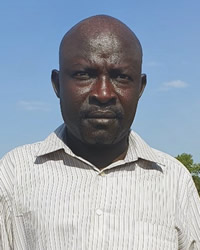The Muslim Kauyaru people reside primarily in the Nuba Mountains of Sudan, a region known for its ethnic diversity and cultural complexity. Historically, the Kauyaru have lived in rural and remote areas, engaging in farming and pastoralism to sustain their communities. Over time, they adopted Islam, which has become central to their identity and way of life. The Kauyaru people have faced challenges related to political instability, economic hardships, and environmental pressures, yet they continue to maintain their distinct identity within the broader Sudanese society.
The Kauyaru people primarily depend on subsistence farming and livestock herding. They grow crops such as millet, sorghum and sesame relying on seasonal rainfall to irrigate their fields. Livestock, particularly goats and cattle, also play a significant role in their economy, providing food income and social status. The community's agricultural practices are shaped by the semi-arid environment of the Nuba Mountains, making them highly dependent on the natural cycles of the land.
The Kauyaru live in small, close-knit villages where extended families cooperate in farming and daily activities. Their homes are typically constructed from mud and thatch, designed to protect against the harsh climate. Community life revolves around family, religious observances and agricultural work. Despite the challenges posed by their remote location, the Kauyaru people remain deeply connected to their land and way of life.
The Kauyaru people follow Sunni Islam, which influences every aspect of their daily lives. They observe the five pillars of Islam, including daily prayers, fasting during Ramadan, and participation in religious festivals such as Eid al-Fitr and Eid al-Adha. The mosque serves as a center for religious and social activities, where religious leaders guide the community's spiritual practices.
Although Islam is the dominant faith, the Kauyaru retain certain traditional beliefs and customs related to nature and the environment. These practices, often linked to agricultural cycles, coexist with their Islamic faith. Religious rituals are performed to ensure the success of crops and livestock, reflecting the integration of both Islamic and indigenous practices.
The Kauyaru people face numerous challenges, particularly related to economic stability, healthcare and education. Their reliance on traditional farming methods leaves them vulnerable to environmental changes, such as droughts and soil degradation, which can severely impact food security. Access to modern agricultural techniques, tools and irrigation systems would help improve their productivity and resilience to climate-related challenges.
Healthcare services are limited in Kauyaru villages, and many families lack access to adequate medical care, leading to higher rates of preventable diseases. Education is also a significant concern, with many children not having access to quality schooling, which limits their future opportunities for economic and social mobility. Development programs focusing on improving healthcare, expanding education and promoting sustainable agriculture would greatly benefit the Kauyaru people, helping them build a more secure future while preserving their traditional values and Islamic faith.
Pray for the Kauyaru people to have their educational and medical needs met.
Pray for gospel workers to catch a vision for reaching the Kauyaru people for Jesus and that in God's sovereign timing their hearts would be open and ready to follow him.
Pray for Jesus movements to bless extended families so the gospel will spread rapidly among this people group.
Pray for the spiritual lives of the Kauyaru people to become fruitful as they follow Christ.
Scripture Prayers for the Kauyaru in Sudan.
Ethnologue: Languages of the World
Reports from Sudanese NGOs on rural communities
Academic research on ethnic and religious groups in Sudan
| Profile Source: Joshua Project |










